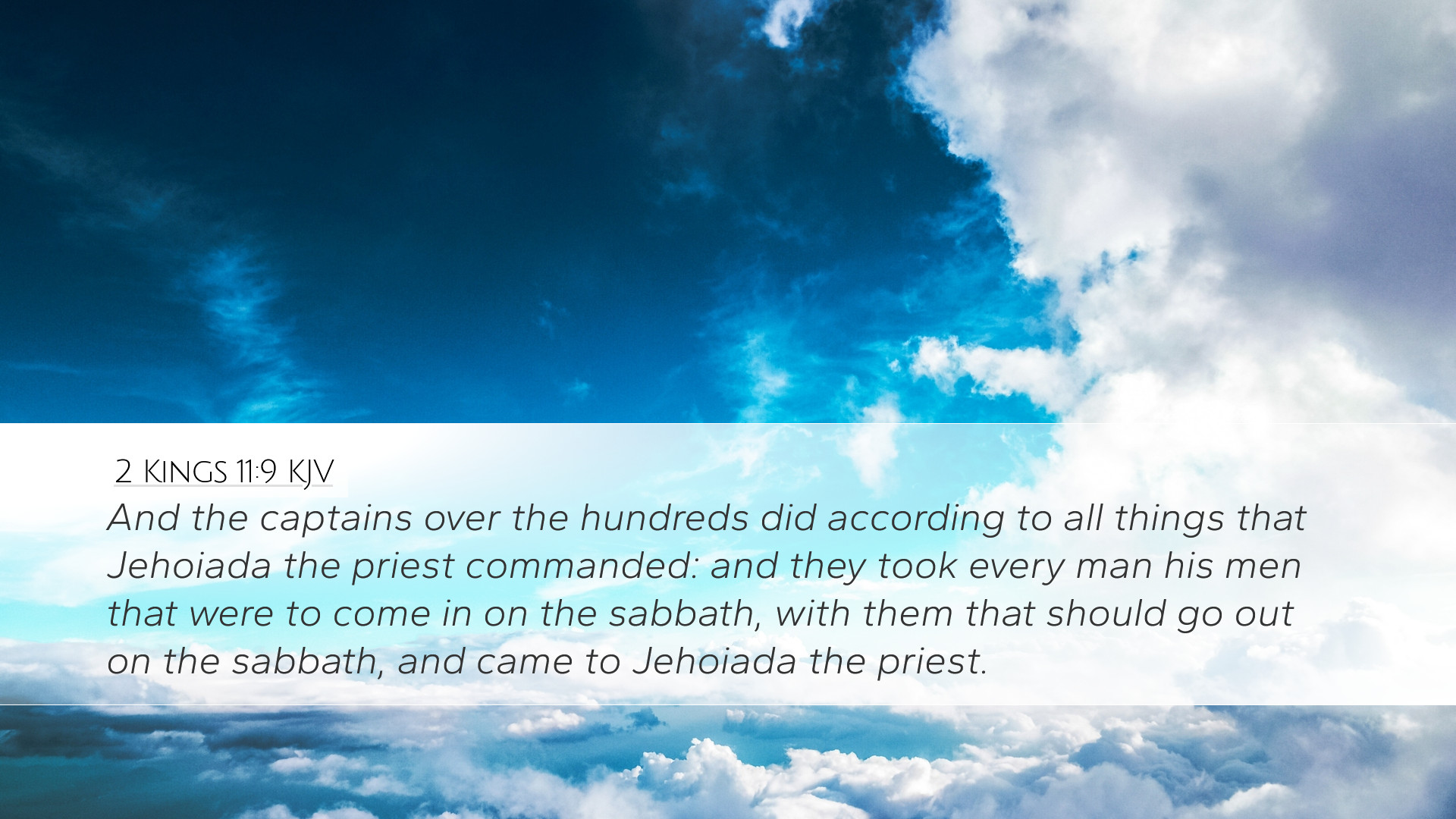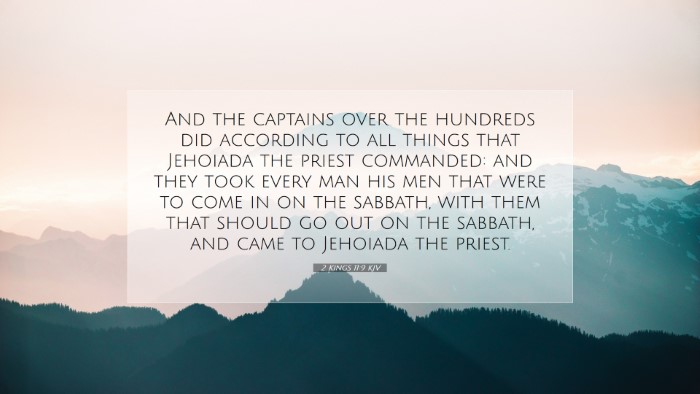Old Testament
Genesis Exodus Leviticus Numbers Deuteronomy Joshua Judges Ruth 1 Samuel 2 Samuel 1 Kings 2 Kings 1 Chronicles 2 Chronicles Ezra Nehemiah Esther Job Psalms Proverbs Ecclesiastes Song of Solomon Isaiah Jeremiah Lamentations Ezekiel Daniel Hosea Joel Amos Obadiah Jonah Micah Nahum Habakkuk Zephaniah Haggai Zechariah Malachi2 Kings 11:9
2 Kings 11:9 KJV
And the captains over the hundreds did according to all things that Jehoiada the priest commanded: and they took every man his men that were to come in on the sabbath, with them that should go out on the sabbath, and came to Jehoiada the priest.
2 Kings 11:9 Bible Commentary
Commentary on 2 Kings 11:9
Verse: "And the captains over hundreds did according to all things that Jehoiada the priest commanded: and they took every man his men that were to come in on the sabbath, with them that should go out on the sabbath, and came to Jehoiada the priest."
Introduction
This verse sets the scene for a critical moment in Israel's history, where the priests and military leaders come together in a fervent alliance against the tyranny of Athaliah. The significance of this mesh between clergy and military is not just a mere historical note but offers insights into the interplay of power dynamics in biblical Israel.
Exegetical Insights
Obedience to Leadership
Matthew Henry notes that the captains acted with diligence and unity under the command of Jehoiada. This indicates a profound respect for ecclesiastical authority and a recognition of the priest's role in guiding the nation both spiritually and politically.
Preparation and Order
Albert Barnes emphasizes the meticulous planning involved in this operation. The captains gathered their men in an orderly fashion, indicating that God was restoring order to a nation that had been enveloped in chaos under Athaliah’s reign. The contrast between the Israelites' previous despair and the emergence of hope under Jehoiada's leadership is pivotal.
Theological Implications
Authority and Governance
Adam Clarke reflects on the theological implications of this text. The collaboration between Jehoiada and the captains highlights a biblical principle where spiritual leaders guide civil authorities. This is foundational in understanding the influence of faith on public life, and it shows that godly authority is essential in establishing righteousness in governance.
Contextual Analysis
Historical Background
Leading up to this moment, Athaliah had seized power, eliminating all potential heirs to the throne. Jehoiada's actions are consistent with the broader biblical theme of God preserving a remnant of His people. In turning the tide against tyranny, this verse exemplifies the critical role of faith in national crises.
Symbolism of the Sabbath
The mention of the Sabbath in this verse is significant. The captains gathered their men in accordance with the Sabbath observance, symbolizing rest and divine order. This indicates a reclaiming of righteousness and sanctity in worship, which is vital for any movement of reform in society. As Captains of the Army, they demonstrated that their military actions were undergirded by a commitment to honor God properly.
Practical Applications
Unity in Purpose
This passage encourages modern-day leaders—both religious and secular—to work in unity for a common cause of justice and righteousness. Just as Jehoiada gathered the captains, church leaders today must collaborate with civic leaders to promote moral and ethical standards in society.
Respect for Authority
The captains’ obedience to Jehoiada serves as a reminder of the biblical principle of respecting authority. For pastors and church leaders, it’s crucial to foster an environment where respect flows from church members towards their governing authorities, provided those authorities uphold righteousness. This obedience must be coupled with discernment, as leaders must promote the will of God above all.
Conclusion
In summary, 2 Kings 11:9 provides profound insights into the proper order of authority and governance. It calls for a unified front among leaders and emphasizes the role of spiritual leadership in bringing about national reform. This passage fundamentally advocates for godly principles to permeate every aspect of life, challenging the faithful to act decisively in times of peril.
This text exemplifies how in the tapestry of history, God orchestrates events through dedicated leaders willing to invest their lives in service to His will. It inspires today's leaders within both the church and community to emulate the steadfast commitment seen in Jehoiada and the captains who stood with him.


